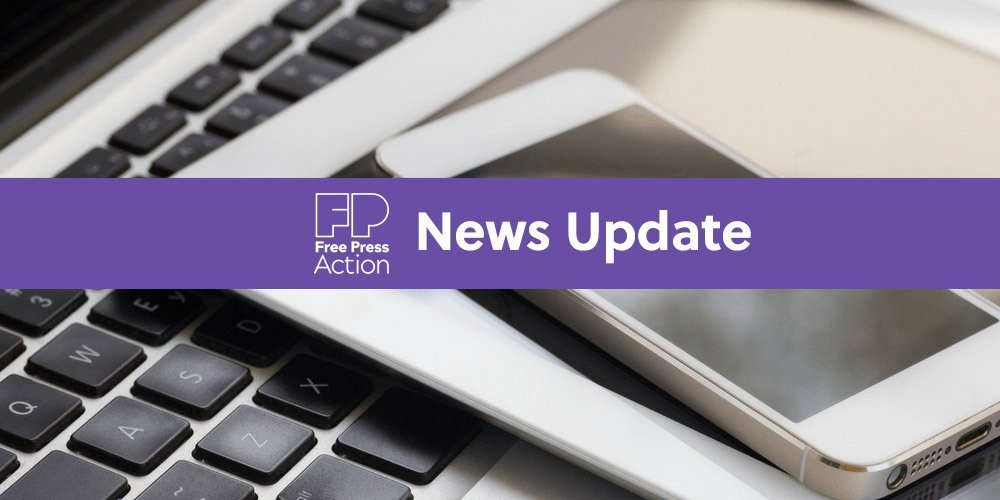Free Press Action Testifies That Oregon Journalism Bill Would Enrich Mega-Media Corporations and Harm the Public Interest

Contact: Timothy Karr, 201-533-8838
SALEM, OR — On Wednesday, Free Press Action submitted testimony before Oregon’s Senate Rules Committee, raising significant concerns about the current draft of a bill introduced to help compensate local-news production.
The Oregon Journalism Protection Act (SB 686) is loosely modeled after legislation that failed to pass through California’s statehouse in 2024 — which would have required online platform companies like Google and Meta to pay in-state news providers through an arbitration process.
SB 686 differs from the California legislation, however, in that it offers two payment options for platforms: They would either have to pay an annual sum of $122 million to news providers or enter into negotiations with individual publishers and arrive at compensation amounts for each. Under either approach, resulting funds would go to news publishers, with 90 percent of the total revenues distributed “proportionally” by the number of journalists each news outlet employed in the previous calendar year. The remaining 10 percent would go to a newly created Oregon Civic Information Consortium (OCIC), which a board of community, media and academic stakeholders would oversee. The OCIC would then distribute funds to local-news initiatives throughout the state in response to the most pressing information needs.
Free Press Action helped create, lobby for and pass a bill creating a similar consortium in New Jersey. The legislation established the New Jersey Civic Information Consortium, which since 2021 has distributed millions of dollars to local news-and-information initiatives. While this is a strong, proven model to support informed communities, Free Press Action is concerned that the revenue share under the Oregon Journalism Protection Act fails to meet the needs of the state’s many independent community publishers. Worse, according to the testimony, the larger share of money would help entrench the dominance of national corporate media conglomerates such as Sinclair Broadcast Group, Gannett and Nexstar Media Group, which all own Oregon affiliates.
Mike Rispoli, Free Press Action’s senior director of journalism and civic information, said:
“There’s no doubt that this moment calls for bold policy change to support local news and informed communities. There’s also no doubt that tech platforms have a role to play in any long-term solutions. But we cannot allow the urgency of this moment to push us toward interventions that would entrench the structural problems now plaguing our media system. SB 686 would do just that.
“Oregon’s ailing local-news landscape mirrors national trends: Large profitable corporate entities are expanding their hold over local-news markets while independent community newsrooms, small publishers, nonprofits and ethnic media outlets — the outlets best equipped to meet communities’ needs — are left to struggle over a meager pool of resources. Legislation should correct this imbalance and chart a sustainable future for our news ecosystem.
“But under the present draft of SB 686, 90 percent of funding would be allocated to newsrooms based on employee headcount, with broad eligibility. This means that the biggest collective winners would be corporate chains and broadcasters, with smaller publishers and startups receiving whatever’s left over. If lawmakers pass SB 686, they could end up solidifying a top-heavy, corporate-dominated media hierarchy in the state that we know isn’t serving communities.
“Any local-news bill should start with a core question: How can lawmakers address the most pressing community-information gaps and support struggling newsroom workers? Public policy should be tailored to the public good, and there are ways to alter the OJPA approach to put community needs first and prioritize independent community publishers. The proposed creation of an Oregon Civic Information Consortium, which would distribute funding more equitably and to outlets that need it most, should be a more central component of the legislation and not an afterthought.
“Legal experts have warned the approach of bills like OJPA is fraught with constitutional challenges, and will very likely lead to the public having less access to quality local news. When lawmakers in Canada advanced a similar bill, Meta blocked Canadian news across its in-country platforms, resulting in significant harm to smaller publishers that had come to rely on Facebook and Instagram to reach their audiences. In California, a similar bill prompted both Meta and Google to threaten to block or restrict news links on their platforms. The legislation stalled out, in part because of concerns over these potential harms.
“There are better legislative options for raising revenue for local journalism. More and more states are advancing and enacting ad taxes and other fees that would carve off a sliver of the windfall revenues tech platforms bring in for distribution to genuinely local outlets. We’re encouraged that Oregon lawmakers are taking a serious look at funding local news, and are eager to continue working with them to refine legislation that supports news and civic information for all of the people of Oregon.”